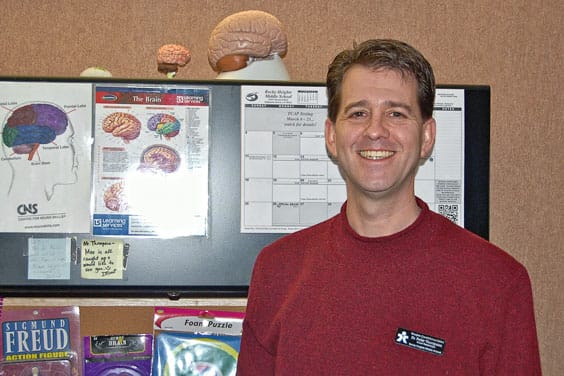New focus on concussions and head trauma in student athletes

Dr. Peter Thompson has a Ph.D. in Psychology with a specialization and dissertation in school neuropsychology. His dedication to the study of the brain has helped the Douglas County School District lead the way in establishing protocols for handling concussions and other head injuries to student athletes.
Article and photo by Amy Shanahan
Dr. Peter Thompson is passionate about the human brain, and has spent the last ten years evaluating and assessing brain injuries. Thompson is the lead psychologist in the Douglas County School District (DCSD), and he was instrumental in starting the district’s Traumatic Brain Injury (TBI) team.
Due to his efforts and those of his collaborators, including school nurses, other psychologists, speech and language pathologists, and athletic trainers, DCSD has the strongest TBI process in the state of Colorado, and serves as a model for other districts. Every student athlete in DCSD who plays in a contact sport is required to take a baseline test before participation in their sport.
Following a concussion or other head injury, an ImPACT Clinical test is given, along with other assessments to determine the extent of the injury, by comparing the results to the baseline test. The athlete’s memory, reaction time and processing speed are all analyzed. Depending on the extent of the injury, the student’s teachers, counselors and school staff are notified as to the protocol for allowing the student to return to the classroom and their sport.
“There are billions of neurons in the brain,” remarked Thompson. “Concussions and head injuries do have an impact long term—the brain has a memory and these things can come back to haunt you.” Concussions are sustained each season by more than 10 percent of high school athletes, and a history of multiple concussions can cause long-term memory loss, clinical depression, and a higher risk of neurologic disease later in life.
Thompson is a member of the Concussion Action Team for the Colorado Department of Education, and he also serves as the school psychologist for Rocky Heights Middle School (RHMS). Thompson’s expertise and knowledge of the brain and its functions have made him the go-to expert in his field. His recommendations and those of his colleagues will ultimately determine if a student athlete is allowed to continue playing their sport.
Madeline Landis is a high school junior and varsity athlete at Rock Canyon high school. She has suffered two concussions while playing soccer and field hockey, and has worked with Dr. Thompson to evaluate the effects. Though her second concussion was considered mild, her first concussion occurred after being hit in her left eye/orbital with a field hockey stick. Landis consulted with Dr. Thompson and a psychologist at Children’s Hospital, and spent three weeks healing. She followed the protocol that they initiated for her and was eventually cleared to play sports again.
Landis knows that another concussion may end her high school sports career and she has made several adjustments by wearing protective headgear during soccer games, and goggles and a mask during field hockey games. Additionally, she stopped playing competitive soccer and she has given up her dream of ever playing soccer at a college level.
“I was really scared after my second concussion that I might never be able to play sports again. Luckily, I have not had any obvious cognitive changes, but physically I feel like I get headaches more often and I dehydrate more easily,” remarked Landis. “I feel really blessed to be able to continue to play for my high school.”
Thompson believes it is vital that parents and the athletic community take concussions and other head injuries seriously. “We have to assess in order to intervene,” stated Thompson. The testing and protocols are vital to the future successes and health of our student athletes.